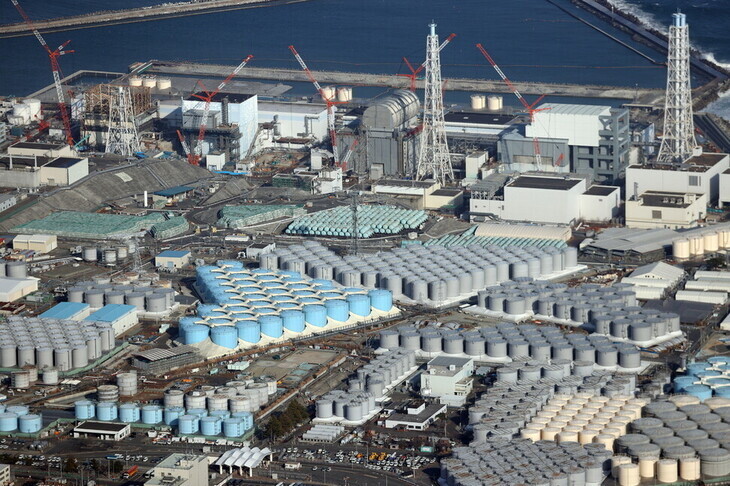hankyoreh
Links to other country sites 다른 나라 사이트 링크
Two of three Japanese contaminated water treating systems didn't receive final approval

Two out of the three advanced liquid processing systems (ALPS) used by Japan to remove radioactive substances from contaminated water from the Fukushima Daiichi Nuclear Power Plant were found not to have received final approval by the Japanese government.
The discovery is expected to heighten safety concerns — as it means the water is to be purified for ocean release using equipment that has not undergone even the minimum procedures.
A video posted Sunday on the website of the Diet of Japan showed a Wednesday meeting of the House of Councillors' Research Committee on Natural Resources and Energy, in which Communist Party lawmaker Taku Yamazoe raised questions about the contaminated water from Fukushima.
"Is it true that the 'pre-use testing' before full-scale operation of ALPS has not been completed?" he asked.
In response, Toyoshi Fuketa, chairperson of the Japanese Nuclear Regulation Authority (NRA), explained, "There was some urgency in terms of how we were to treat and store the contaminated water."
"In that sense, we did skip over procedures such as pre-use testing in a sense," he admitted.
Yamazoe went on to note that the trial operation has been underway for eight years.
"Doesn't this mean that the conditions have not been established for treating [the water]?" he asked.
The NRA's regulations state that before nuclear energy equipment and facilities can be used, they must first go through a review of installation approval standards, construction plans and security regulations, after which they must pass "pre-use testing" to verify their suitability in terms of technical standards. The regulations were intensified in the wake of the explosion that occurred at Fukushima Daiichi in 2011.
But among the ALPS systems that the Tokyo Electric Power Company (TEPCO) began using in March 2013 and September and October 2014, the first and third have yet to undergo pre-use testing. This means the contaminated water has been purified through equipment in the "trial operation" stage that has not yet received final approval.
Various flaws have already been reported with the untested ALPS systems.
According to a report drafted by TEPCO in October 2018, the first ALPS system was found to be performing inadequately in its removal of certain radioactive substances, including iodine-129, ruthenium-106 and antimony-125. The third ALPS system was reported to have a short performance duration for the removal of strontium-90 and other substances.
Because of the inadequate ALPS systems used in the first purification process, 70 percent of the contaminated water stored in tanks at the Fukushima Daiichi site contained potentially lethal radioactive materials such as cesium, iodine and strontium and levels above the allowable threshold.
Strontium-90, a particularly toxic carcinogen, was found to be mixed with the water at levels ranging from over 110 times the threshold to as high as 20,000 times.
TEPCO stated that it planned to perform a second ALPS purification process to reduce the radioactive substances below the threshold before releasing the water into the ocean, but it has not disclosed more specific information.
"It is a very serious problem when the chairperson of the Nuclear Regulation Authority admits that [ALPS] has not completed its review procedures for full-scale operation," explained Ryukoku University environmental economics professor Kenichi Oshima in a recent interview with Nikkan Gendai.
"It doesn't even meet the prerequisites for treating contaminated water," he said.
"The Japanese government and TEPCO are not qualified to be in charge [of the water's treatment]."
By Kim So-youn, staff reporter
Please direct comments or questions to [english@hani.co.kr]

Editorial・opinion
![[Editorial] Penalties for airing allegations against Korea’s first lady endanger free press [Editorial] Penalties for airing allegations against Korea’s first lady endanger free press](https://flexible.img.hani.co.kr/flexible/normal/500/300/imgdb/original/2024/0502/1817146398095106.jpg) [Editorial] Penalties for airing allegations against Korea’s first lady endanger free press
[Editorial] Penalties for airing allegations against Korea’s first lady endanger free press![[Editorial] Yoon must halt procurement of SM-3 interceptor missiles [Editorial] Yoon must halt procurement of SM-3 interceptor missiles](https://flexible.img.hani.co.kr/flexible/normal/500/300/imgdb/child/2024/0501/17145495551605_1717145495195344.jpg) [Editorial] Yoon must halt procurement of SM-3 interceptor missiles
[Editorial] Yoon must halt procurement of SM-3 interceptor missiles- [Guest essay] Maybe Korea’s rapid population decline is an opportunity, not a crisis
- [Column] Can Yoon steer diplomacy with Russia, China back on track?
- [Column] Season 2 of special prosecutor probe may be coming to Korea soon
- [Column] Park Geun-hye déjà vu in Yoon Suk-yeol
- [Editorial] New weight of N. Korea’s nuclear threats makes dialogue all the more urgent
- [Guest essay] The real reason Korea’s new right wants to dub Rhee a founding father
- [Column] ‘Choson’: Is it time we start referring to N. Korea in its own terms?
- [Editorial] Japan’s rewriting of history with Korea has gone too far
Most viewed articles
- 11 in 3 S. Korean security experts support nuclear armament, CSIS finds
- 2Months and months of overdue wages are pushing migrant workers in Korea into debt
- 3Bills for Itaewon crush inquiry, special counsel probe into Marine’s death pass National Assembly
- 4Trump asks why US would defend Korea, hints at hiking Seoul’s defense cost burden
- 5[Reporter’s notebook] In Min’s world, she’s the artist — and NewJeans is her art
- 6[Editorial] Penalties for airing allegations against Korea’s first lady endanger free press
- 7S. Korea discusses participation in defense development with AUKUS alliance
- 8[Column] Can Yoon steer diplomacy with Russia, China back on track?
- 9Vietnamese war victims speak of sexual violence by S. Korean troops for the first time
- 1060% of young Koreans see no need to have kids after marriage